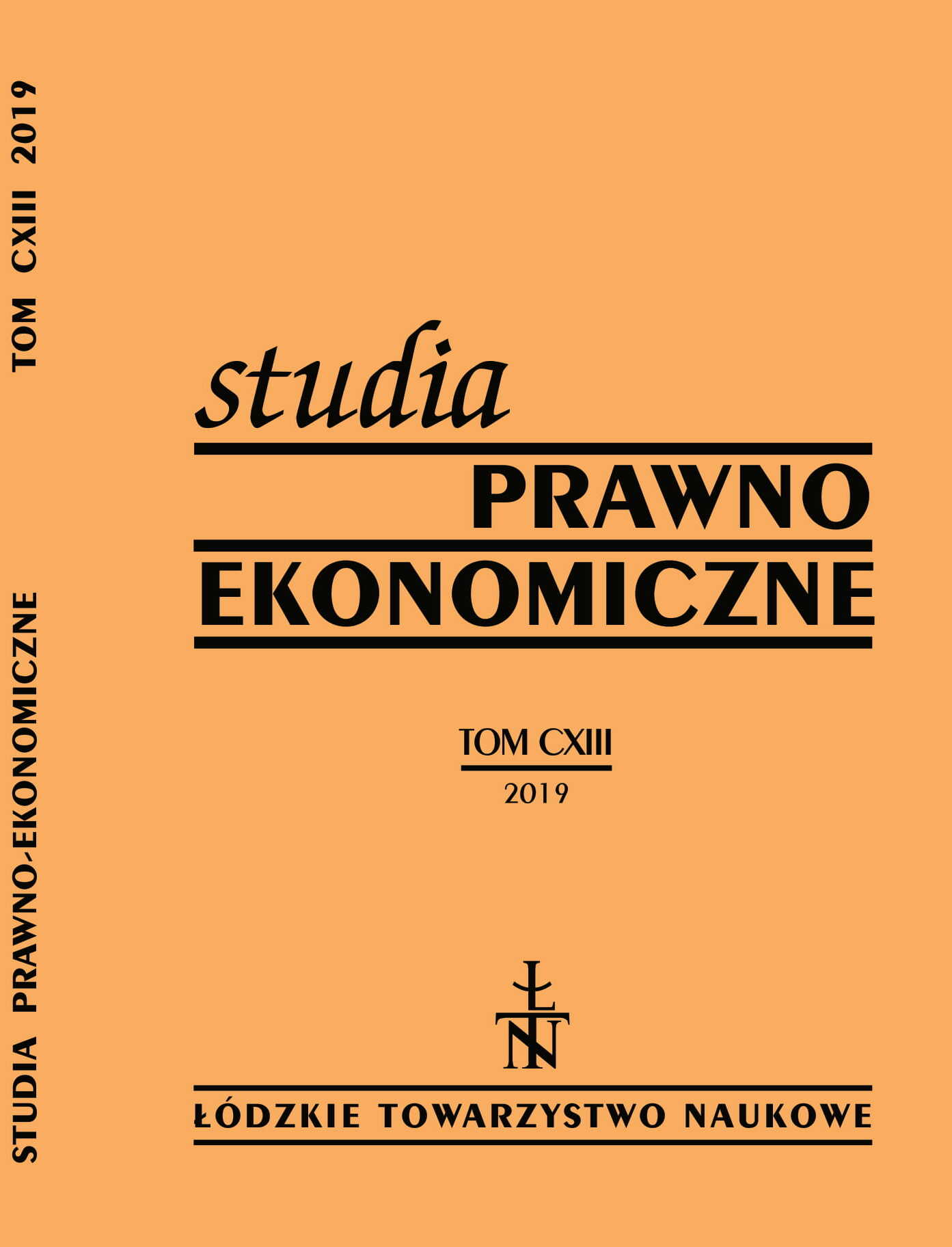Constitutional grounds of labour law and labour law codification in the years 2016–2018 – a few thoughts
DOI:
https://doi.org/10.26485/SPE/2019/113/8Keywords:
Codification Committee, human labour, axiology of labour lawAbstract
Background: The Labour Law Codification Committee worked from 15 September 2016 until 15 March 2018, and over these 18 months a team of 14 labour law experts was supposed to codify both individual and collective labour law. As you know, despite such a short timeframe, this Committee prepared two drafts: individual and collective labour law. Certain representatives of both employers and employees voted against the aforementioned drafts, yet they remained involved in the works until the end. In retrospect, this completely incomprehensible situation can be explained by the often lack of understanding of the political foundations of the state that determine the socio-economic order and, as a result, labour matters (in my opinion, it cannot be explained in any reasonable way, and I remember how lively discussions at meetings sometimes were, with numerous disagreements showing that the participants were absolutely poles apart, despite representing the same social partner). After all, the works on the labour code did not leave much room for manoeuvre for Committee members preparing its provisions. Thus, there is a question about the true reasons behind such a status quo. That is the subject matter of the study.
Research purpose: The goal behind the present study is to find the answer to the question about the reasons behind ignoring the provisions of the Constitution, as these provisions should at all times be the guiding light when working on the draft code, thus defining the limits for the codification. At this point, I hypothesise that the Polish legal thinking about the labour law is unfortunately poorly rooted ideologically in the provisions of the Constitution in force, and the Constitution is sometimes deeply misunderstood as regards its subject matter, i.e. the socio-economic order, and the labour aspect to be precise.
Conclusions: I think that the reasons behind this can be traced to the fact the Polish labour law of the transition period was not bound by any constitutional principles at all. It was made somewhat ‘on the side’, as a side effect of the economic changes, and any attempts at defining the labour regime that might override the economic changes have failed. Even the Constitution that entered into force in 1997, with its strong effort to determine this labour order, did not overcome the habit of lawmaking that is sometimes, in a way, axiologically detached from the provisions of the Constitution. What is more, the vision of a social market economy based on the solidarity of social partners and the recognition of worker’s dignity, among others, is hardly promoted, if at all.
Downloads
References
Dekret Prezydenta Rzeczypospolitej z dnia 22 listopada 1938 r. o ochronie niektórych interesów Państwa (Dz.U., nr 91, poz. 623).
Konstytucja Polskiej Rzeczypospolitej Ludowej uchwalona przez Sejm Ustawodawczy w dniu 22 lipca 1952 r. (Dz.U., z 1952 r., nr 33, poz. 232 ze zm.).
Konstytucja Rzeczypospolitej Polskiej z dnia 2 kwietnia 1997 r. (Dz.U., nr 78, poz. 483 ze zm.).
Projekt Ustawy Konstytucyjnej z dnia 25 listopada 1992 r. – Karta Społeczna i Ekonomiczna, www.sejm.gov.pl; stan na 1.01.2019 r.
Traktat pokoju między mocarstwami sprzymierzonemi i skojarzonemi i Niemcami podpisany w Wersalu dnia 23 czerwca 1919 r. (Dz.U., nr 1920, nr 35, poz. 200).
Ustawa Konstytucyjna z dnia 23 kwietnia 1935 r., Dz.U., nr 30, poz. 227.
Ustawa Konstytucyjna z dnia 17 października 1992 r. o wzajemnych stosunkach między władzą ustawodawczą i wykonawczą Rzeczypospolitej Polskiej oraz o samorządzie terytorialnym (Dz.U., nr 84, poz. 426).
Ustawa z dnia 17 marca 1921 r. – Konstytucja Rzeczypospolitej Polskiej (Dz.U., nr 44, poz. 267 ze zm.).
Ustawa z dnia 26 czerwca 1974 r. Kodeks pracy (Dz.U. z 1974 r., nr 24, poz. 141 ze zm.).
Ustawa z dnia 23 grudnia 1988 r. o działalności gospodarczej (Dz.U., nr 41, poz. 324).
Ustawa z dnia 29 grudnia 1989 r. nowelizująca Konstytucję z dnia 22 lipca 1952 r., (Dz.U., nr 75, poz. 444).
Ustawa z dnia 29 grudnia 1989 r. o zmianie Konstytucji Polskiej Rzeczypospolitej Ludowej (Dz.U., nr 75, poz. 444).
Ustawa z dnia 2 lutego 1996 r. o zmianie ustawy – Kodeks pracy oraz o zmianie niektórych ustaw (Dz.U., nr 24, poz.110).
Lutosławski Wincenty, Jak rośnie dobrobyt? Zarys polskiej teorii gospodarstwa narodowego, Kraków 1936.
Matey Maria (red.), Nowy ład pracy w Polsce i w Europie, Warszawa 1997.
Mazurkiewicz Józef, Zagadnienie pracy w Konstytucjach powojennych, Prace z dziedziny socjalistyki, Lublin 1926.
Szarecki Artur, Kapitalizm somatyczny. Ciało i władza w kulturze korporacyjnej, Warszawa 2017.
Zieliński Tadeusz, Nowy ład pracy – rzeczywistość i wizja przyszłości, w: Tadeusz Zieliński, Prawo pracy. Zarys systemu. Część I. Ogólna, Państwowe Wydawnictwo Naukowe, Warszawa 1986.



